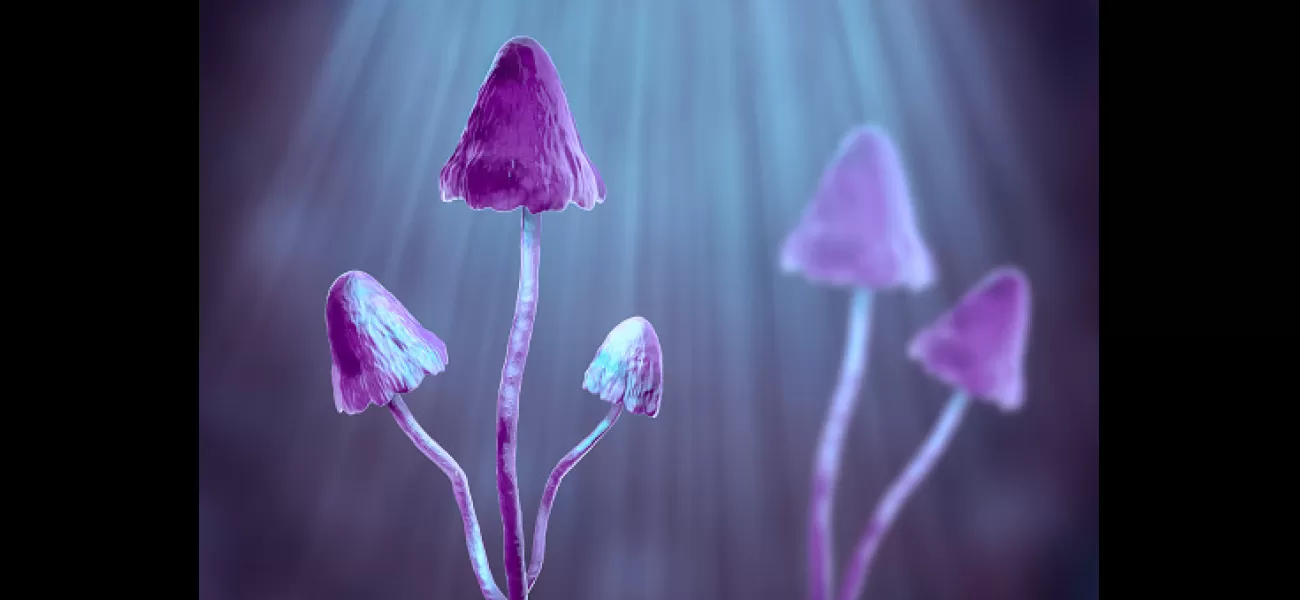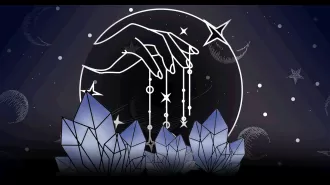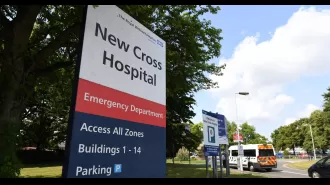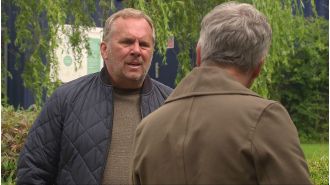Could mushrooms provide a viable treatment for PTSD?
The weight of worry lifted, replaced by hope instead of avoidance.
June 24th 2023.

Earlier this year, Labour MP Charlotte Nichols shared a heartbreaking account of her experience living with post traumatic stress disorder. Speaking in parliament on May 18, she told how seeing a stranger on a train platform who bore a resemblance to her attacker nearly triggered her into throwing herself in front of a train. She also recalled how hearing the same piece of music played on the day her condition began made her vomit. And how her days living with this serious mental health condition have been a living hell.
An estimated 10% of the UK population are going through PTSD like Charlotte, and she wanted to speak out to help them. She didn’t just want to assure them they weren’t alone, but to highlight something she believes is a potential cure – psilocybin, the main psychedelic compound in magic mushrooms.
It’s a bold claim – but one which is a valid one, according to Dr Jo Neill, Professor of Psychopharmacology at the University of Manchester, who has been working in drug discovery for psychiatry for 40 years. As far as Professor Neill is concerned, psilocybin ‘heals people’. And she’s not the only expert alone in this belief.
‘Heal’ is not a word we generally use in psychiatry,’ Professor Neill tells The Agency. ‘We would love to heal people, but really we just help them to manage symptoms often with drugs which come with potentially serious side effects. But psychedelics are healing people, with just one or two doses of psilocybin, maybe with an occasional top-up. It’s extraordinary, like nothing we’ve ever seen before and a complete paradigm shift in medicine that eliminates the side effect burden.
This is why Charlotte Nichols is fighting so hard for patient access to psilocybin alongside 25 other cross-party members. She feels that the evidence supporting its medical use and safety is, in reality, strong. ‘I am hopeful that this sort of treatment may offer a light at the end of a very dark tunnel and finally give me my life back,’ she told the House of Commons.
Discussion surrounding psychedelic medicine has come into the mainstream in a big way in recent years, with celebrities such as Prince Harry and Drew Barrymore voicing their support and personal experience with everything from mushrooms to Ayahuasca. While countries such as Australia have made the move to legalise psilocybin and MDMA for therapeutic use, due to the ever-growing body of evidence to support the remarkable benefits.
However, here in the UK, despite numerous studies proving medical effects and no serious side effects, psilocybin remains a schedule 1 drug – which means officially it has no recognised medicinal value and is deemed more harmful than heroin. ‘Psychedelic drugs don’t even fit the definition of a Schedule 1 drug,’ argues Professor Neill. ‘Not only does that keep these substances out of the hands of patients who need them, but it makes it very hard to do research, too.’
Keith Abraham, is CEO of Heroic Hearts and has also stepped in to plead for psychedelic-assisted therapy to be made available to veterans in need. As part of the House of Commons debate in May, he sent an open letter to Veterans Minister, Johnny Mercer MP, calling on him to support the rescheduling of psilocybin so that veterans can get access to psychedelic treatment. Unfortunately, like all other members of parliament who could make the changes Keith felt were so desperately needed with immediate effect, he did not.
Research found how psilocybin stimulates the growth and repair of brain cells in the hippocampus – the centre for memory and emotion. In 2013, a study from the University of South Florida revealed that psilocybin may help break the traumatic cycle of PTSD. Then, in the first study of its kind conducted on humans in 2018, researchers at the Institute of Psychiatry, Psychology & Neuroscience at King’s College London also provided evidence for safety. They found that administering 10-25mg doses of pure psilocybin caused no serious adverse effects, and no negative effects on cognitive and emotional functioning.
Now, there are ‘phase 3’ clinical trials underway, where psychedelics are being directly compared with the best current treatments available. So far psilocybin has been compared head to head with Escitalopram/Esketamine for depression – a condition which affects more than 280 million people worldwide. In both cases, psilocybin was as effective as the pharmaceutical drug, however, the effects were much longer lasting.
Yet despite all of this, someone in possession of magic mushrooms , could wind up in prison for up to seven years. ‘The only risk that comes from these drugs is their illegal status, causing a lack of education,’ says Professor Neill. ‘I read a case report of a chap who injected himself with mushroom tea. He nearly died of a bacterial and fungal infection in his blood. Not because the mushrooms are inherently dangerous, but because they shouldn’t be injected into the bloodstream. That wouldn’t have happened if he was able to talk openly about how you should take it.’
Regardless of legal status, a huge proportion of the UK population are taking matters into their own hands, and taking psilocybin unlawfully. The 2021 Global Drug Survey revealed that 1 in 5 people in the UK illegally micro-dosed psychedelics such as magic mushrooms and LSD throughout the pandemic, to support their mental health. Over half of adults in the UK support the rescheduling of psilocybin.
Mum of one, Rebecca Allen Tap, 34, believes that psilocybin has been instrumental in helping her maintain good mental health since receiving a cancer diagnosis. This is why Charlotte Nichols is so passionate about fighting for patient access to psilocybin, and why it is so important the UK government recognises the potential healing power psychedelics have and makes them available to those who need them.
Earlier this year, Labour MP Charlotte Nichols gave an incredibly powerful account of living with post traumatic stress disorder in Parliament. Speaking on May 18th, she recalled how the sight of a stranger on a train platform, who bore a resemblance to her attacker, nearly prompted her to throw herself in front of a train. She also shared how hearing the same piece of music played on the day her condition began made her vomit and how her days living with this serious mental health condition had been a living hell.
Charlotte wasn’t just giving this account to assure others that they weren’t alone, she was also speaking out to highlight something she believes could be a potential cure: psilocybin, the main psychedelic compound found in magic mushrooms.
This bold claim is backed up by Dr Jo Neill, Professor of Psychopharmacology at the University of Manchester. She has been working in drug discovery for psychiatry for 40 years and is adamant that psilocybin ‘heals people’. In her words, “Heal” is not a word we generally use in psychiatry. We would love to heal people, but really we just help them to manage symptoms - often with drugs which come with potentially serious side effects. But psychedelics are healing people, with just one or two doses of psilocybin, maybe with an occasional top-up. It’s extraordinary, like nothing we’ve ever seen before and a complete paradigm shift in medicine that eliminates the side effect burden.
Charlotte is campaigning alongside 25 other MPs, for patient access to psilocybin. She is hopeful that this treatment may offer a light at the end of a very dark tunnel and finally give her her life back. Discussion surrounding psychedelic medicine has gained a lot of traction and support in recent years. Countries such as Australia have made the move to legalise psilocybin and MDMA for therapeutic use due to the ever-growing body of evidence to support the remarkable benefits.
Unfortunately, despite numerous studies proving medical effects and no serious side effects, psilocybin remains a schedule 1 drug in the UK, meaning it has no recognised medicinal value and is deemed more harmful than heroin. This keeps the substance out of the hands of those who need it and makes it very hard to do research.
Keith Abraham, CEO of Heroic Hearts, sent an open letter to Veterans Minister, Johnny Mercer MP, calling on him to support the rescheduling of psilocybin. Although veterans are often at the forefront of this conversation, it’s actually rape that accounts for 49% of PTSD cases in the UK.
A 2013 study from the University of South Florida revealed that psilocybin may help break the traumatic cycle of PTSD. The research found how it stimulates the growth and repair of brain cells in the hippocampus - the centre for memory and emotion. After being given psilocybin, the mice studied were able to overcome fear conditioning at a much higher rate than those given a placebo.
In 2018, researchers at the Institute of Psychiatry, Psychology & Neuroscience at King’s College London provided evidence for safety. They found that administering 10-25mg doses of pure psilocybin caused no serious adverse effects, and no negative effects on cognitive and emotional functioning.
Phase 3 clinical trials are now underway, where psychedelics are being compared directly with the best current treatments available. So far, psilocybin has been compared head to head with Escitalopram/Esketamine for depression. In both cases, psilocybin was as effective as the pharmaceutical drug, however, the effects were much longer lasting.
It’s clear that psilocybin has the potential to provide major benefits to those in need, but unfortunately someone in possession of magic mushrooms could wind up in prison for up to seven years. The only risk that comes from these drugs is their illegal status, causing a lack of education.
Despite this, a huge proportion of the UK population are taking matters into their own hands, and taking psilocybin unlawfully. The 2021 Global Drug Survey revealed that 1 in 5 people in the UK illegally micro-dosed psychedelics such as magic mushrooms and LSD throughout the pandemic, to support their mental health. Over half of adults in the UK support the rescheduling of psilocybin.
Mum of one, Rebecca Allen Tap, 34, believes that psilocybin has been instrumental in helping her maintain good mental health since receiving a cancer diagnosis. With more and more people experiencing the benefits of psilocybin, it’s time to seriously look at the potential of this powerful treatment and ensure it is made available to those who need it.
An estimated 10% of the UK population are going through PTSD like Charlotte, and she wanted to speak out to help them. She didn’t just want to assure them they weren’t alone, but to highlight something she believes is a potential cure – psilocybin, the main psychedelic compound in magic mushrooms.
It’s a bold claim – but one which is a valid one, according to Dr Jo Neill, Professor of Psychopharmacology at the University of Manchester, who has been working in drug discovery for psychiatry for 40 years. As far as Professor Neill is concerned, psilocybin ‘heals people’. And she’s not the only expert alone in this belief.
‘Heal’ is not a word we generally use in psychiatry,’ Professor Neill tells The Agency. ‘We would love to heal people, but really we just help them to manage symptoms often with drugs which come with potentially serious side effects. But psychedelics are healing people, with just one or two doses of psilocybin, maybe with an occasional top-up. It’s extraordinary, like nothing we’ve ever seen before and a complete paradigm shift in medicine that eliminates the side effect burden.
This is why Charlotte Nichols is fighting so hard for patient access to psilocybin alongside 25 other cross-party members. She feels that the evidence supporting its medical use and safety is, in reality, strong. ‘I am hopeful that this sort of treatment may offer a light at the end of a very dark tunnel and finally give me my life back,’ she told the House of Commons.
Discussion surrounding psychedelic medicine has come into the mainstream in a big way in recent years, with celebrities such as Prince Harry and Drew Barrymore voicing their support and personal experience with everything from mushrooms to Ayahuasca. While countries such as Australia have made the move to legalise psilocybin and MDMA for therapeutic use, due to the ever-growing body of evidence to support the remarkable benefits.
However, here in the UK, despite numerous studies proving medical effects and no serious side effects, psilocybin remains a schedule 1 drug – which means officially it has no recognised medicinal value and is deemed more harmful than heroin. ‘Psychedelic drugs don’t even fit the definition of a Schedule 1 drug,’ argues Professor Neill. ‘Not only does that keep these substances out of the hands of patients who need them, but it makes it very hard to do research, too.’
Keith Abraham, is CEO of Heroic Hearts and has also stepped in to plead for psychedelic-assisted therapy to be made available to veterans in need. As part of the House of Commons debate in May, he sent an open letter to Veterans Minister, Johnny Mercer MP, calling on him to support the rescheduling of psilocybin so that veterans can get access to psychedelic treatment. Unfortunately, like all other members of parliament who could make the changes Keith felt were so desperately needed with immediate effect, he did not.
Research found how psilocybin stimulates the growth and repair of brain cells in the hippocampus – the centre for memory and emotion. In 2013, a study from the University of South Florida revealed that psilocybin may help break the traumatic cycle of PTSD. Then, in the first study of its kind conducted on humans in 2018, researchers at the Institute of Psychiatry, Psychology & Neuroscience at King’s College London also provided evidence for safety. They found that administering 10-25mg doses of pure psilocybin caused no serious adverse effects, and no negative effects on cognitive and emotional functioning.
Now, there are ‘phase 3’ clinical trials underway, where psychedelics are being directly compared with the best current treatments available. So far psilocybin has been compared head to head with Escitalopram/Esketamine for depression – a condition which affects more than 280 million people worldwide. In both cases, psilocybin was as effective as the pharmaceutical drug, however, the effects were much longer lasting.
Yet despite all of this, someone in possession of magic mushrooms , could wind up in prison for up to seven years. ‘The only risk that comes from these drugs is their illegal status, causing a lack of education,’ says Professor Neill. ‘I read a case report of a chap who injected himself with mushroom tea. He nearly died of a bacterial and fungal infection in his blood. Not because the mushrooms are inherently dangerous, but because they shouldn’t be injected into the bloodstream. That wouldn’t have happened if he was able to talk openly about how you should take it.’
Regardless of legal status, a huge proportion of the UK population are taking matters into their own hands, and taking psilocybin unlawfully. The 2021 Global Drug Survey revealed that 1 in 5 people in the UK illegally micro-dosed psychedelics such as magic mushrooms and LSD throughout the pandemic, to support their mental health. Over half of adults in the UK support the rescheduling of psilocybin.
Mum of one, Rebecca Allen Tap, 34, believes that psilocybin has been instrumental in helping her maintain good mental health since receiving a cancer diagnosis. This is why Charlotte Nichols is so passionate about fighting for patient access to psilocybin, and why it is so important the UK government recognises the potential healing power psychedelics have and makes them available to those who need them.
Earlier this year, Labour MP Charlotte Nichols gave an incredibly powerful account of living with post traumatic stress disorder in Parliament. Speaking on May 18th, she recalled how the sight of a stranger on a train platform, who bore a resemblance to her attacker, nearly prompted her to throw herself in front of a train. She also shared how hearing the same piece of music played on the day her condition began made her vomit and how her days living with this serious mental health condition had been a living hell.
Charlotte wasn’t just giving this account to assure others that they weren’t alone, she was also speaking out to highlight something she believes could be a potential cure: psilocybin, the main psychedelic compound found in magic mushrooms.
This bold claim is backed up by Dr Jo Neill, Professor of Psychopharmacology at the University of Manchester. She has been working in drug discovery for psychiatry for 40 years and is adamant that psilocybin ‘heals people’. In her words, “Heal” is not a word we generally use in psychiatry. We would love to heal people, but really we just help them to manage symptoms - often with drugs which come with potentially serious side effects. But psychedelics are healing people, with just one or two doses of psilocybin, maybe with an occasional top-up. It’s extraordinary, like nothing we’ve ever seen before and a complete paradigm shift in medicine that eliminates the side effect burden.
Charlotte is campaigning alongside 25 other MPs, for patient access to psilocybin. She is hopeful that this treatment may offer a light at the end of a very dark tunnel and finally give her her life back. Discussion surrounding psychedelic medicine has gained a lot of traction and support in recent years. Countries such as Australia have made the move to legalise psilocybin and MDMA for therapeutic use due to the ever-growing body of evidence to support the remarkable benefits.
Unfortunately, despite numerous studies proving medical effects and no serious side effects, psilocybin remains a schedule 1 drug in the UK, meaning it has no recognised medicinal value and is deemed more harmful than heroin. This keeps the substance out of the hands of those who need it and makes it very hard to do research.
Keith Abraham, CEO of Heroic Hearts, sent an open letter to Veterans Minister, Johnny Mercer MP, calling on him to support the rescheduling of psilocybin. Although veterans are often at the forefront of this conversation, it’s actually rape that accounts for 49% of PTSD cases in the UK.
A 2013 study from the University of South Florida revealed that psilocybin may help break the traumatic cycle of PTSD. The research found how it stimulates the growth and repair of brain cells in the hippocampus - the centre for memory and emotion. After being given psilocybin, the mice studied were able to overcome fear conditioning at a much higher rate than those given a placebo.
In 2018, researchers at the Institute of Psychiatry, Psychology & Neuroscience at King’s College London provided evidence for safety. They found that administering 10-25mg doses of pure psilocybin caused no serious adverse effects, and no negative effects on cognitive and emotional functioning.
Phase 3 clinical trials are now underway, where psychedelics are being compared directly with the best current treatments available. So far, psilocybin has been compared head to head with Escitalopram/Esketamine for depression. In both cases, psilocybin was as effective as the pharmaceutical drug, however, the effects were much longer lasting.
It’s clear that psilocybin has the potential to provide major benefits to those in need, but unfortunately someone in possession of magic mushrooms could wind up in prison for up to seven years. The only risk that comes from these drugs is their illegal status, causing a lack of education.
Despite this, a huge proportion of the UK population are taking matters into their own hands, and taking psilocybin unlawfully. The 2021 Global Drug Survey revealed that 1 in 5 people in the UK illegally micro-dosed psychedelics such as magic mushrooms and LSD throughout the pandemic, to support their mental health. Over half of adults in the UK support the rescheduling of psilocybin.
Mum of one, Rebecca Allen Tap, 34, believes that psilocybin has been instrumental in helping her maintain good mental health since receiving a cancer diagnosis. With more and more people experiencing the benefits of psilocybin, it’s time to seriously look at the potential of this powerful treatment and ensure it is made available to those who need it.
[This article has been trending online recently and has been generated with AI. Your feed is customized.]
[Generative AI is experimental.]
0
0
Submit Comment





